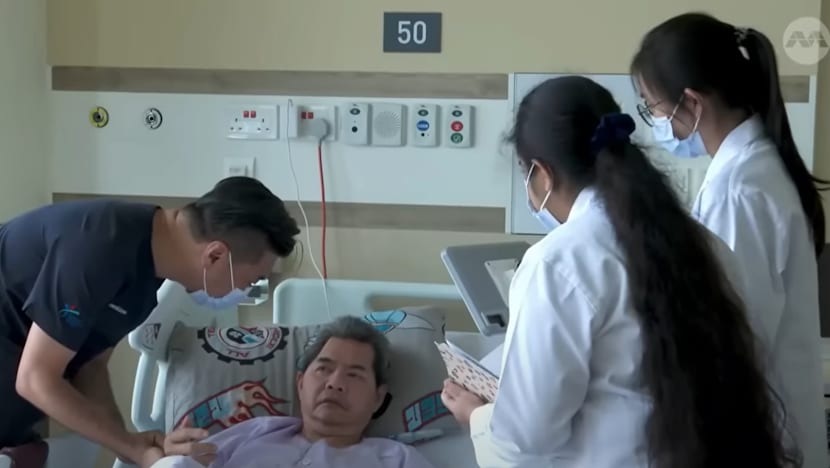Health
Tan Tock Seng Hospital Partners with NTU to Integrate TCM

Tan Tock Seng Hospital (TTSH) in Singapore has announced a partnership with Nanyang Technological University (NTU) to incorporate traditional Chinese medicine (TCM) into inpatient care. This initiative, launched on October 9, 2023, aims to enhance the integration of Eastern and Western medical practices within the national healthcare system.
Mr. Tan Kay Chuan, a 60-year-old stroke patient, represents the potential benefits of this integration. Currently undergoing rehabilitation at TTSH, he receives acupuncture twice a week, a practice that may soon be more widely adopted across the hospital’s treatment plans. TTSH offers a variety of TCM therapies, including acupuncture and cupping, and seeks to incorporate these methods into a holistic approach to patient care.
NHG Health, TTSH’s healthcare cluster, has proposed this integrative medicine model to the Ministry of Health’s regulatory sandbox. Since January, the ministry has been evaluating 18 evidence-based TCM treatments in public hospitals as part of the TCM Integrative Sandbox Initiative. These treatments include acupuncture for conditions such as migraines, post-stroke rehabilitation, and cancer-related care.
Exploring the Future of Integrative Medicine
Professor Benjamin Seet, group chairman of the medical board (research) at NHG Health, expressed optimism about the partnership, suggesting it could lead to expanded subsidies for various traditional medicine practices in public healthcare settings. Currently, subsidies are limited to acupuncture for lower back and neck pain. “I think obviously the potential applications are way beyond that,” he stated during the announcement at the Singapore Health and Biomedical Congress.
The regulatory sandbox allows TTSH to gather clinical evidence regarding the effectiveness of TCM in patient care. Prof Seet noted that future applications might extend beyond acupuncture to include tuina (Chinese therapeutic massage) and acupressure. He emphasized the importance of a controlled environment for gathering evidence that will guide future clinical practices.
Associate Professor Linda Zhong, director of biomedical sciences and Chinese medicine at NTU, highlighted the collaborative approach to assessing TCM treatment suitability for patients. “We will determine the conditions under which acupuncture can be applied, as well as its frequency and duration,” she explained, ensuring patient safety while evaluating treatment effectiveness.
Preparing Future Practitioners
Starting in 2027, NTU’s Chinese Medicine students will participate in a 13-week clinical rotation at TTSH during their final year, dedicating three hours a week to practical experience. This initiative aims to equip a new generation of TCM practitioners to meet the increasing demand for integrated healthcare solutions. According to a national population health survey conducted in 2022, one in five adults in Singapore utilizes TCM annually, with nearly 40 percent combining it with Western medical treatments.
“Our students are trained in both biomedical sciences and Western medicine, alongside fundamental clinical research knowledge,” noted Associate Professor Zhong. This comprehensive training prepares them to communicate effectively about patient histories, diagnoses, and treatment plans.
Teo Chun Yong, secretary-general of the Singapore Chinese Physicians’ Association, noted a growing interest in certain TCM treatments, particularly for chronic pain and infertility. He pointed out that even migrant workers are increasingly turning to TCM for pain management related to workplace injuries, seeking faster recovery to return to work.
At the Chung Hwa Medical Institution, which serves as the association’s headquarters, practitioners are beginning to employ modern diagnostic tools for traditional assessments, such as tongue and pulse examinations. Teo acknowledged the government’s recent call for more evidence-based TCM practices, stating, “I think what we could do more is find common grounds whereby we can work towards the common good for the patients.”
The collaboration between TTSH and NTU represents a significant step towards integrating TCM into mainstream medical practice in Singapore, potentially transforming patient care through a more holistic approach.
-

 Business5 months ago
Business5 months agoKenvue Dismisses CEO Thibaut Mongon as Strategic Review Advances
-

 Lifestyle4 months ago
Lifestyle4 months agoHumanism Camp Engages 250 Youths in Summer Fest 2025
-

 Sports4 months ago
Sports4 months agoDe Minaur Triumphs at Washington Open After Thrilling Comeback
-

 Sports5 months ago
Sports5 months agoTupou and Daugunu Join First Nations Squad for Lions Clash
-

 Top Stories5 months ago
Top Stories5 months agoColombian Senator Miguel Uribe Shows Signs of Recovery After Attack
-

 World5 months ago
World5 months agoASEAN Gears Up for Historic Joint Meeting of Foreign and Economic Ministers
-

 Health4 months ago
Health4 months agoNew Study Challenges Assumptions About Aging and Inflammation
-

 Business5 months ago
Business5 months agoOil Prices Surge Following New EU Sanctions on Russia
-

 Entertainment4 months ago
Entertainment4 months agoDetaşe-Sabah Violin Ensemble Captivates at Gabala Music Festival
-

 Entertainment4 months ago
Entertainment4 months agoBaku Metro Extends Hours for Justin Timberlake Concert
-

 Top Stories5 months ago
Top Stories5 months agoRethinking Singapore’s F&B Regulations Amid Business Closures
-

 Business5 months ago
Business5 months agoU.S. House Approves Stablecoin Bill, Sends to Trump for Signature









